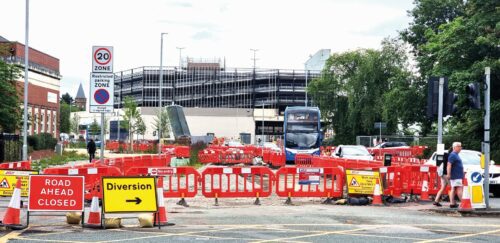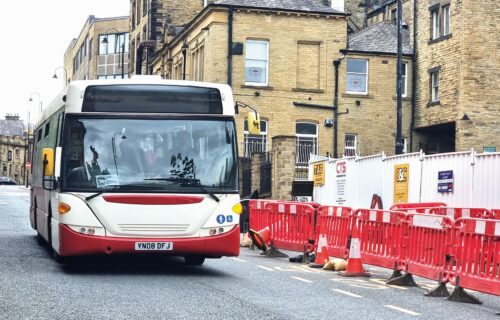
The Transport Committee has proposed a number or changes and improvements to the way that street works are carried out by utility companies
Local authorities should be given new powers to limit disruption and congestion caused by street works carried out by utility companies, the Transport Committee has said.
In a report published on 3 July, the cross-party Committee calls for tighter controls on the use of ‘immediate’ or ‘urgent’ permits which allow utility companies to bypass local authorities before they start, and guarantees that an excavated road will then be reinstated to a high standard. MPs also call for the Government to let all local highway authorities adopt ‘lane rental schemes’ under which utility companies pay a charge for each day that works are carried out on a road as an incentive for efficiency. The inquiry leading up to the publication of the report also heard concerns that when roads are reinstated to a poor standard, it increases the chances of councils being left to put things right with more road works later on.
Figures show that around 2.2 million street and road works were carried out in England between April 2023 and March 2024 by over 200 organisations.
Minimising the inevitable
The Committee acknowledged that in many cases, some level of disruption is unavoidable to keep utility services running, but heard what it says is ‘overwhelming evidence’ from local authorities that the current regulatory regime leaves them ill-equipped to monitor and coordinate utility companies’ street works, or to penalise companies that behave improperly, leading to disruption for road users.
Transport Committee Chair Ruth Cadbury explained: “Street works are essential. Ageing infrastructure inevitably needs maintaining, and new cables and pipes will need laying as more housing is built across the country. But as every road user knows, street works can feel like a recurring nightmare. The complaints are all too familiar: temporary traffic lights appearing overnight on a road that was already dug up a few months ago, sites left unattended on weekends, works overrunning, lorries diverted down roads too small for them, and disabled people often unable to negotiate their way around the site safely. People are left wondering, ‘why does the council let this happen?’. I’ve also heard from site workers who too often face the wrath of the travelling public.
“Our report sets out a shopping list of small changes that could make a huge difference, sharpening the teeth of the regulations that already exist while also providing incentives for utility companies to work efficiently and coordinate their work with councils. Upping the quality of reinstatement works will help stem the never-ending plague of potholes on local roads. Lane rental schemes should provide a financial incentive to complete works on time. And longer-term planning and earlier notification should help councils prevent the infuriating occurrence of multiple roads being closed in one locality, or the same road being dug up multiple times in one year.”

Recommendations
Chief among the recommendations made by the Committee are:
● Extending the reinstatement period:
Current regulations in England say that utility companies are responsible for the quality of the road surfaces they have reinstated for two years after street works have completed, or for three years for deeper excavations, although research has shown that reinstatements carried out properly usually last over a decade. The Committee therefore recommends that the guarantee period for reinstatements should be extended to five years, a change which it says will incentivise companies to do a better job when reinstating road surfaces.
● Tightening the use of immediate permits:
Immediate and urgent permits are recognised as being essential in situations such as a burst water main causing localised flooding, but the Committee recommends that the Department for Transport (DfT) should consult on a new definition that prevents the use of these permits in situations which are not genuinely urgent. Proposed options include introducing a new category of immediate permit which accommodates work to maintain the supply of a service but is not going to be fixed immediately, or reforming immediate permits so that the level of advance warning required is linked to the severity of disruption, whilst it is recommended that the DfT should also consider whether fines could also be used against companies which are found to have misused immediate permits.
● Lane rental schemes:
At present, only a small number of local authorities already have Government approval to use lane rental schemes, with current daily charges of up to £2,500 per day, depending on the category of the road and levels of traffic. The Government has said it will consider letting Mayoral Strategic Authorities approve their own lane rental schemes, whilst in other areas this approval will remain with the Secretary of State; the Committee argues that DfT should go further and let more local authorities set up their own schemes without the need for approval from the Secretary of State.
● Longer-term planning:
The DfT has guidance in place that encourages, but does not require, utility companies to share ‘forward planning information’ and encourages local authorities and utility companies to identify opportunities to coordinate work to avoid multiple companies digging up the same area of road in short succession. The Committee has urged the DfT to make this a requirement rather than guidance, and says it should also apply during construction of large new housing developments.
● A Street Works Commissioner:
The Committee recommends that the DfT should consider introducing a Street Works Commissioner in England, similar to the Road Works Commissioner in Scotland, to help ensure the consistent application and interpretation of legislation, provide an option for independent dispute resolution between councils and companies, and monitor performance across the sector, which it believes would provide clarity for the street works industry and help promote good practice.
Responding to the report, Keith McNally, Operations Director at the Confederation of Passenger Transport, said: “Street works are a massive source of frustration for bus passengers. Too many buses are delayed and diverted by utilities digging up roads at short notice with little regard for disruption. Delays and cancellations from street works have contributed to a 13.5% real terms in increase in bus operators’ costs per mile since 2019 – a cost that is inevitably passed on to passengers.
“The bus industry backs the Transport Committee’s recommendations. We urge the Government to crack down on street works carried out under ‘emergency’ permits when they aren’t really emergencies.”

